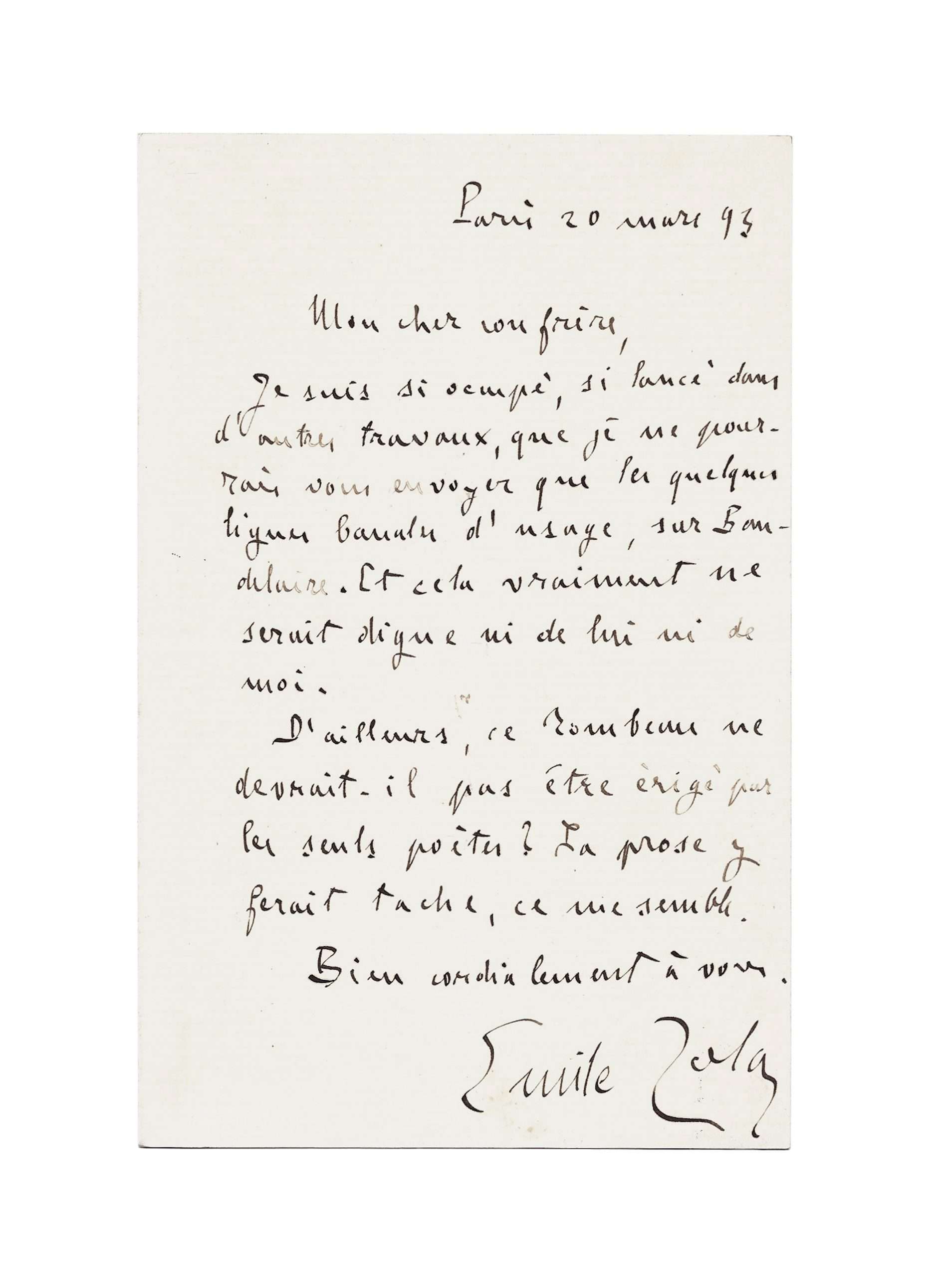[BAUDELAIRE] ZOLA, Émile (1840-1902)
Autograph letter signed « Emile Zola » [to Léon Deschamps]
Paris, 20th March 1893, 1 p. in-8° on laid paper
« A few usual banal lines about Baudelaire… »
Fact sheet
[BAUDELAIRE] ZOLA, Émile (1840-1902)
Autograph letter signed « Emile Zola » [to Léon Deschamps]
Paris, 20th March 1893, 1 p. in-8° on laid paper
Zola refuses writing a text to support the project of a monument in tribute to Baudelaire
« Mon cher confrère,
Je suis si occupé, si lancé dans d’autres travaux [Zola travaillait à son ultime volume des Rougon-Macquart], que je ne pourrais vous envoyer que les quelques lignes banales d’usage, sur Baudelaire. Et cela est vraiment ne serait digne ni de lui ni de moi.
D’ailleurs, ce tombeau ne devrait-il pas être érigé par les seuls poètes ? La prose y ferait tache, ce me semble.
Bien cordialement à vous
Emile Zola »
On 1 August 1892, Léon Deschamps, founder of La Plume, launched a subscription in his magazine for a statue in homage to Baudelaire. Zola was one of the many writers and artists who responded favourably to this call. In a letter to Deschamps he wrote: “I can only be very proud to be part of the committee for a monument to Charles Baudelaire. Sign me up and I’ll be the one to say thank you.” This short epistle was reprinted as it was in Deschamps’ diary a fortnight later, alongside other literary figures of the time. Ferdinand Brunetière, a defender of classicism and traditionalism, nevertheless vigorously opposed the project, in an article published in La Revue des deux mondes on 1 September 1920. After several months of polemics, the project failed (see La Querelle de la statue de Baudelaire (August-December 1892), ed. André Guyaux, Presses de l’Université Paris-Sorbonne, 2007).
Léon Deschamps had once again solicited the naturalist writer who, in this sympathetic reply, declined the invitation to write a text to support the project, which had been undermined by Brunetière and a few others. Had he considered his participation in the committee eight months earlier sufficient? He had not always been indulgent towards the poet, who was probably too close to reality to appreciate “the graceful melancholy and noble despair that inhabit the supernatural regions of Poetry” (Baudelaire, “Théophile Gautier”, L’Artiste, 13 March 1859). We remember the murderous article he wrote in Le Gaulois of January 10, 1869 (p. 3): “I like to imagine him as a literary cenobite who has dug a narrow niche for himself in a hard rock and who has lived there alone, in front of the hallucinations of his unhinged brain. He was not a creator, and if his imagination was carried away by strange audacity, it was singularly unfruitful […] If one wants a summary judgment of The Flowers of Evil, I would say: ‘In a hundred years, the Histories of French Literature will speak of this book as a curiosity […]’ »
Unpublished letter
